
The Boston-area trolleybus system formed part of the public transportation network serving Greater Boston in the U.S. state of Massachusetts. It opened on April 11, 1936, with a large network operating for the next quarter-century. Measured by fleet size, the Boston-area system was the second-largest trolleybus system in the United States at its peak, with only the Chicago system having more trolleybuses than Boston's 463. After 1963, the only remaining portion was a four-route cluster operating from the Harvard bus tunnel at Harvard station, running through Cambridge, Belmont, and Watertown. The Massachusetts Bay Transportation Authority took over the routes in 1964.

Servicio de Transportes Eléctricos de la Ciudad de México (STE) is a public transport agency responsible for the operation of all trolleybus and light rail services in Mexico City. As its name implies, its routes use only electrically powered vehicles. It was created on 31 December 1946 and is owned by the Mexico City government. STE is overseen by a broader local governmental authority, Secretaria de Movilidad de la Ciudad de México (SEMOVI)(Secretariat of Mobility of Mexico City), formerly (SETRAVI) which also regulates the city's other public transport authorities, including Sistema de Transporte Colectivo, Red de Transporte de Pasajeros del Distrito Federal and Metrobús, as well as other forms of transportation in the district. STE's passenger vehicle fleet consists exclusively of trolleybuses, light rail, and aerial lift vehicles, and in 2007 its network carried 88 million passengers, of which 67 million were on trolleybus services and 21 million on light rail.

The Mexico City trolleybus system serves Mexico City, the capital city of Mexico, and is operated by Servicio de Transportes Eléctricos.
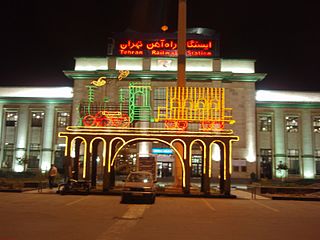
Rah Ahan Square is a square located in southern Tehran, Iran. Tehran Railway Station is located at this square.
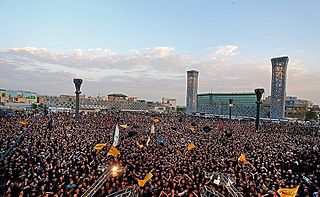
Imam Hossein Square, or Meydan-e-Emam-Hoseyn, is a square in eastern central Tehran, Iran. The architecture was designed by Karl Schlamminger.
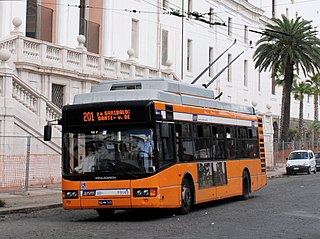
Trolleybuses in Naples provide a portion of the public transport service in the city and comune of Naples, in the region of Campania, southern Italy. From 1964 to 2015, two independent trolleybus systems were in operation, both publicly owned, but only that of Azienda Napoletana Mobilità (ANM) remains in operation. The ANM system opened in 1940, whereas the smaller trolleybus network of Compagnia Trasporti Pubblici di Napoli (CTP) opened in 1964.

The Rome trolleybus system forms part of the public transport network of the city and comune of Rome, Italy. In operation since 2005, the current system comprises three routes.

The Sanremo trolleybus system or San Remo trolleybus system, also known as the Italian Riviera trolleybus, is focused on the town and comune of Sanremo, in the region of Liguria, northwestern Italy.
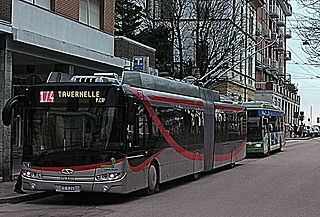
The Ancona trolleybus system forms part of the public transport network of the city and comune of Ancona, in the Marche region, central Italy. In operation since 1949, the system presently comprises only one urban route.
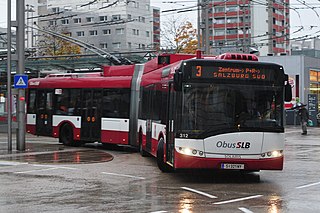
The Salzburg trolleybus system forms part of the public transport network serving Salzburg, capital of the federal state of Salzburg in Austria. Opened on 1 October 1940, it replaced the Salzburg tramway network.

The Lausanne trolleybus system forms part of the public transport network of Lausanne, in the canton of Vaud, Switzerland. The system has been in operation since 1932 and is the third-oldest surviving trolleybus system in the world, after those of Shanghai and Philadelphia.
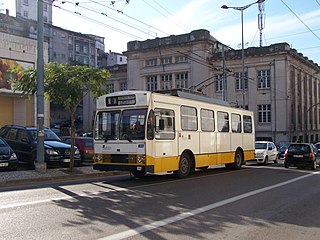
The Coimbra trolleybus system formed part of the public transport network in the city of Coimbra, Portugal. Opened in 1947, it supplemented, and then eventually replaced, the Coimbra tramway network. Service was suspended in March 2021 because of road construction, and officials stated that the suspension was temporary, but in late 2022 the mayor indicated that any resumption of trolleybus service would not occur until after completion of construction of a new Bus Rapid Transit line, around late 2024. However, in July 2024, the city council voted not to resume service – to make the suspension a permanent closure – albeit with a proposal floated for a future tourist trolleybus operation along the banks of the Mondego River, without further detail given.

The Córdoba trolleybus system is part of the public transport network in Córdoba, the capital city of Córdoba Province, Argentina.

The Guadalajara trolleybus system serves Guadalajara, the capital city of the state of Jalisco in Mexico.

The Tehran trolleybus system serves Tehran, the capital city of Iran. Opened in 1992, it is the only trolleybus system ever to have existed in Iran. At its maximum extent, the system had five routes, served by at least 65 trolleybuses. The system closed in 2013, but reopened in 2016 with one route and a fleet of around 30 modernised Škoda 15Tr.

The Lecce trolleybus system forms part of the public transport network of the city and comune of Lecce, in the Apulia region, southern Italy.
As of 2012 there were around 300 cities or metropolitan areas where trolleybuses were operated, and more than 500 additional trolleybus systems have existed in the past. For complete lists of trolleybus systems by location, with dates of opening and closure, see List of trolleybus systems and the related lists indexed there.

The Avellino trolleybus system forms part of the public transport network of the city of Avellino and the province of Avellino, in the region of Campania. Trolleybuses originally served the city from 1947 to 1973, on a route that also extended outside the city to the neighbouring towns of Atripalda and Mercogliano, and then the system closed. However, in the 2000s work to build a new trolleybus system got under way and new vehicles were purchased for it in 2007, and were delivered in 2014. The project experienced several delays after the start of construction in 2009, but most issues had been resolved by 2020 and construction was largely completed by 2021. Throughout its planning and construction, it was inaccurately referred to as the "metropolitana leggera", when in fact it was never planned to be a rail line, and always planned to be a trolleybus line. The last round of testing took place in December 2022 and January 2023, and the new trolleybus system opened for service on 3 April 2023.


















